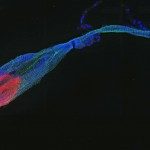Lien vers Pubmed [PMID] – 2509372
Infect. Immun. 1989 Dec;57(12):3856-62
Two peptides representing separate 13-amino-acid sequences of staphylococcal alpha-toxin have been synthesized and acrylamide gel-purified alpha-toxin monomer and hexamer forms have been prepared and used to produce antisera in rabbits. We report here that each synthetic peptide, P-I and P-II, induces the formation of a specific precipitating antiserum. Moreover, these sera also react with the toxin monomer and sometimes with the hexamer, indicating that each peptide has more than one epitope. The purified toxin monomer can induce antibodies to fragments of toxin but is significantly less potent than the hexamer in inducing antibodies to the toxin monomer and almost not effective in inducing a response to the toxin hexamer. The purified toxin hexamer induces responses that are almost the reciprocals of the monomers, with the antihexamer and -monomer responses dominating and almost no responses to fragments of toxin being induced. These responses are interpreted in terms of the stability of the toxin hexamer to proteolytic degradation, compared with the relative sensitivity of the monomer to proteases. In assays of toxin-neutralization activity, only those sera containing antihexamer antibodies can block toxin hemolytic activity. This is true for both peptide- and toxin-induced antisera. The basis for this apparent association between toxin-neutralizing potency and antihexamer reactivity is being studied. Peptide P-I contains the uniquely reactive tyrosine residue and may be involved in monomer-to-monomer associations required to form hexamers. Peptide P-II is near the carboxyl terminus of alpha-toxin and may be involved in the binding of toxin to membranes. In a study of the ability of each peptide to inhibit the rate of hexamer formation induced by membrane lipoprotein, peptide P-I (as expected) proves to be more efficient than peptide P-II. Finally, one rabbit immunized with the toxin hexamer produces antibodies to peptides P-I and P-II. This finding suggests that the two synthetic peptides selected for study are relevant to the in vivo immunoprocessing of staphylococcal alpha-toxin.

